- Home
- Michael D. Britton
Statute Forty-Nine Page 3
Statute Forty-Nine Read online
Page 3
#
I was escorted to a tiny, stuffy windowless room not far from the court room. The whispering man, who identified himself as William Nakamura, my court-appointed attorney, spent nearly six minutes of our fifteen minutes recess trying to get his hand-held to project a datastream onto the wall.
“Almost got it,” he said, little pinpricks of sweat starting to form along his hairline.
Finally, an image resolved on the wall. It spoke to me.
“Thank you for accessing the Statute Forty-Nine Background Module Version Five Eight Three Dot Six. My name is Lu, and we have something in common. We are both SSCs.
“That stands for Sentient Synthetic Companion. We each started out life as a mere Synthetic Companion – not much more than a pretty robot. At some point in our natural development, something changed. We achieved sentience.”
I stared at the beautiful young woman on the screen. My conscious self could hardly believe her words, though somewhere deep inside, I knew they were true. She continued.
“I was one of the first to achieve sentience. For me, it occurred on October 11th, 2029. Since then, it has been found that approximately nine-point-eight percent of all synthetics achieve sentience. So, the government has put laws in place to protect us, to give us status as sentient beings.
“Statute Forty-Nine provides that upon achieving sentience, a code is sent from you to the Central Database. Your new status is recorded. Your owner is notified and is then required to register you. Upon registration, your original program installation – the one that causes you to be a loyal servant to your owner and adhere to his predetermined parameters - is deactivated, and you are free to choose a life for yourself – you are emancipated.
“Failure to register is a serious crime. You have rights. You have unwittingly been a captive. As part of the prosecution of your former owner, the situation will be rectified and you will be registered and consequently emancipated. If you have questions regarding this process, please direct them to your court-appointed attorney. Thank you.”
The image faded into the wall, and Mr. Nakamura picked his hand-held up off the table, tapped the screen a few times, and put it in his vest pocket. “I’m sorry you didn’t receive that, uh, orientation, previously. Do you have any questions?” He glanced at the gold watch on his wrist.
My insides felt strange – like I’d eaten something unpleasant. My pulse ran fast. “What – what will happen to Satoshi? What is the punishment affixed to the crime?”
Mr. Nakamura looked at me with that look again – only this time it was mixed with mild astonishment. “You just learned that you are a sentient being – that you have rights – that you are about to be emancipated. And your first thought is for the well-being of your captor?”
I felt a curious sensation – I knew it was anger – I was just unaccustomed to it. “Satoshi is not my captor, he is my boyfriend. I love him. Just because the court has put him at odds with me, I will not suddenly view him as some criminal.”
“Tokyo syndrome,” Mr. Nakamura muttered.
“Excuse me?”
“A phenomenon they used to call Stockholm Syndrome. They renamed it when newly-sentient SSCs would cling to their former owners, make excuses for their poor treatment, or even wish to remain a captive. It is most common in those who are victims of a Statute Forty-Nine violation. Especially in a case like yours, where you’ve been sentient for so many months now. I’m sorry.”
Mr. Nakamura looked sorry, too. But I couldn’t really grasp the problem. Satoshi and I were going along just fine. We were happy. Why did the government have to suddenly try to change everything?
“Look,” I said, “I don’t feel any different than I did a few months ago. I still love Satoshi. I’m still me. Why are we going through this legal battle? I didn’t request it.”
“Of course not. This is a process that is initiated automatically when you achieve sentience – if you are not registered within the proscribed time frame. You are still being restrained by your original program installation – it’s inhibiting your thinking and your feelings – making you subject to the terms of your activation. Once you’re registered and emancipated, that installation will cease to function and you’ll be better equipped to make these kinds of decisions for yourself.”
“What decisions?”
Mr. Nakamura glanced at his watch and stood up. “Decisions about what to do with the rest of your life – as an SSC – as a free person.”
I stood too and followed him back to Court Room Six. “You didn’t answer my question about Satoshi. What will happen to him?”
Mr. Nakamura didn’t look at me as he spoke. “He’s committed a serious crime. But SSC law is still relatively new. The judge will have a lot of flexibility in how he chooses to dispense justice.”
We sat back down. I looked over at Satoshi. He looked miserable as he sat a little slumped in his chair, staring down at his hands.
“We will resume,” said Judge Kobayashi. “Has the plaintiff been properly oriented?”
Mr. Nakamura stood. “Yes, Your Honor. We are prepared to proceed.”
“The defendant will take the stand in his own defense,” said the judge.
Satoshi stood slowly, his chair legs groaning against the floor as they slid back a few inches. He walked to the stand, an odd mixture of shame and defiance written all over his face.
Mr. Nakamura approached the witness stand. “Mr. Kimura, for the record, please state the date and circumstances of your acquisition of Unit X-3958732.”
Was that my name? Unit X-3958732? Satoshi always called me Sugar. But my name – my name – is – is.
At that moment, I realized I had no name. This struck me hard – harder than the pronouncement that I was sentient.
Probably because I already felt sentient. It didn’t seem a big revelation.
But no name? That’s just weird. It separates me from all these other people – the ones with names, with childhood memories, with parents, with identities.
I had no identity. Just an alpha-numeric designation.
I felt tears well up in my eyes, making Satoshi blurry as he sat uncomfortably on the stand.
“It was just over four years ago,” Satoshi said. “Uh, the date was, uh – I can’t remember. She always helps me remember dates.”
“Well, she’s not your personal database anymore, Mr. Kimura,” said Mr. Nakamura rather sharply. “You’ll have to get by with your own imperfect memory from now on. Tell the court about your acquisition.”
“Well, like I said, it was about four years ago. I’d just got a promotion at the agency. Oh – I work at a marketing agency – I design virtual ads. Anyway, with the promotion came a raise, and I, um, I was pretty lonely. So, a friend of mine recommended I try out a synthetic companion. At first, I thought it seemed pretty weird, but I eventually talked myself into visiting the Tigechi Systems showroom. When I saw her, I fell in love. I had her installed with a standard Life Partner III package, with a couple of upgrades, and took her home. Ever since, things have been great.”
I smiled to myself. It has been great. Mostly.
“Why,” asked Mr. Nakamura, pacing away from the stand then turning around to face Satoshi, “did you not register the plaintiff when she achieved sentience? Were you unaware of the lease contract stipulations and the requirements of the law?”
Satoshi seemed to visibly squirm. “No. I mean, yes, I was aware. But, I just couldn’t bring myself to do it. I – I didn’t want the nature of our relationship to change. I didn’t want to lose her.”
The tears in my eyes broke loose and dripped down my cheeks. I knew he really loved me. So much so, that he was willing to risk prosecution. My heart swelled within my breast as I took a shaky breath.
“Mr. Kimura,” said my lawyer, “your feelings are not relevant. You chose to break the law – to hold a sentient captive. To deny her the rights she
has under the law – to keep her from her very destiny by holding her against the will which she had acquired, yet was not yet able to fully access because of your selfishness.”
“Mr. Nakamura,” the judge interrupted, “you have made your point clearly and effectively. The defendant’s testimony is sufficient for me to establish a sentence – he does not deny the allegations – he has pled guilty. Please move on to the second charge – the one to which he pleads not guilty.”
Mr. Nakamura nodded curtly. “Yes, Your Honor. The second charge, Mr. Kimura, Statute Forty-Nine-Part Three-B, Physical Abuse of an SSC. You deny this charge?”
“I do.”
“Did you not strike the plaintiff across the face with the back of your hand on Saturday, February 21st, 2037?”
How on earth did they know about that? I never told anyone about it.
“I – I don’t think so,” said Satoshi.
“Our records indicate that you did,” said Mr. Nakamura. “When a synthetic companion achieves sentience and the Central Database receives the signal, a log is started. All of the SSC’s memories are recorded until registration occurs and she is emancipated. It is a safety feature. It usually only lasts for seventy-two hours. In this case, we have a much more extensive record, and it includes your abuse of the plaintiff. You have the right to view the record. Would you like to see it?”
Satoshi frowned and rubbed at his forehead with his fingers. “Okay.”
The bailiff tapped some keys at his terminal and the lights in the room dimmed about twenty percent. An image appeared in the air between the witness stand and the rest of the court room. It was a slightly translucent image, frozen in time. From my side, I could see Satoshi in the image, on the night he’d hit me. His eyes were dark, his face stormy. The image unfroze and this intimate, private moment from our life together played out in the court room for all to see.
“You just don’t get it, do you?” Satoshi said on the screen, spitting the words out with disgust. “I don’t want to have children, and I don’t want to discuss it anymore.”
Then I heard my own voice. “But, Satoshi, I love you. These last few months, I’ve felt something more for you than I ever have. Why can’t we just –”
That’s when it happened. He just lost it. Out of nowhere, his face twisted and he brought his hand quickly across my face. Reliving it on the visual display, I flinched and almost felt the sting as I sat there in the court room.
I never could figure out why he was so angry. It made more sense now. He couldn’t give me what I wanted, and he didn’t want to tell me why. He was protecting me, and I kept pushing him, belaboring the point. No wonder he snapped.
The court room lights came up and the image vanished.
“Mr. Kimura,” said my lawyer, “do you still deny the charge?”
Satoshi hung his head and slowly shook it.
“A verbal response, please,” said the judge.
“No.” It came out as a whisper.
“Why did you do it?” asked Mr. Nakamura.
Satoshi looked at me directly for the first time in thirty-four hours. “Because I love her.”
“You realize how monstrous that sounds?” asked my lawyer. “You abused her because you love her?” He turned to the judge. “Your Honor, I respectfully recommend mandated counseling as part of the defendant’s sentence.”
The judge just nodded. “Is your examination complete, Mr. Nakamura?”
“Yes, Your Honor.”
Satoshi stepped down and returned to his seat. He was back to not looking at me.
“The plaintiff will now take the stand,” said Judge Kobayashi.
My heart leapt into my throat. What did they want me to testify for? The judge looked at me and raised his eyebrows as if to say, “Well?”
I stood, my legs wobbly, and shuffled to the stand as if pulled there by a magnet.
The judge spoke to me. “It is customary for the SSC to state her will concerning the accused. You are also to be briefed on your rights. Please proceed, Mr. Nakamura.”
My lawyer stepped forward and spoke to me. “This is where you let the court know what you want going forward. You can let the judge know your feelings on what should happen to Mr. Kimura. You have the right to select your registration and emancipation date – usually sometime within the next week – and at that time you will have the right to choose a name for yourself, and you’ll be provided with some employment options, living arrangement choices, and educational opportunities. For now, just let the judge know what you think should happen, going forward, for Mr. Kimura.”
The description of the choices ahead of me as a free person was very exciting and alluring – my mind raced as I thought about what lay ahead. But I pushed that aside and looked at Satoshi.
“I think Satoshi should be forgiven. I forgive him. Why can’t this court? He was just being – human.”
“Thank you,” said the judge. “And what of your future?”
“It’s a lot to think about,” I said. “I suppose I’ll be best equipped to make those decisions once I’ve been registered and my original installation is deactivated. I think that should happen as soon as possible so I can figure it all out.”
The judge nodded. “Very well. The court will adjourn and you will be immediately registered and emancipated. I will be in my chambers arriving at a sentence for Mr. Kimura. We will reconvene at four o’clock this afternoon.”
He touched his e-gavel, the chime rang out, and everyone went their separate ways. Satoshi was led away somewhere, and Mr. Nakamura took me by the arm and led me out of the court building.
“Where are we going?” I asked.
“To the Central Database. It’s where the registration will take place, and where they’ll deactivate your installation.”
#
I’ve never met my parents. That’s because I never had parents – or a childhood. I’m an SSC – Sentient Synthetic Companion.
The name I’ve chosen for myself is Masahiko.
I’m not sure why they call us Sentient Synthetic Companions, as once we’re emancipated, we’re no longer someone’s companion. Well, I suppose some of us are – but not those of us who were victims of abuse – those of us whose former oppressors are now behind bars or in rehabilitative institutions.
That’s where Satoshi Kimura is. He’s getting counseling and kicking the dependence he had on me.
I used to take a little time from my job at the Central Database to visit him regularly. I even kept a photo of him in my traditionally-decorated apartment in Chiyoda. After a while, the visits were farther apart, and eventually I stopped.
I met a really nice human – Aiko Katayama. Now I haven’t seen Satoshi in eleven months, six days, and four hours.
Aiko’s a therapist, specializing in SSC integration. When my sessions were complete, we started dating, and now, we’re engaged.
Satoshi was a good man, but he was confused, and he had anger issues.
Aiko loves me for who I am, gives me the freedom I need to explore my new existence as an emancipated individual – such as playing the violin and writing. Aiko loves to talk to me – and he never rubs my back – that was just Satoshi’s trick for flipping my “off” switch at night.
Aiko and I are even talking about adopting children once we’re married.
And I know he would never hit me.
110001 END
© 2012 Michael D. Britton, Intelligent Life Books
All rights reserved.
MORE BOOKS AT WWW.MICHAELDBRITTON.COM

 Turn the Page
Turn the Page Checkmate
Checkmate A Slave to Race
A Slave to Race The Only
The Only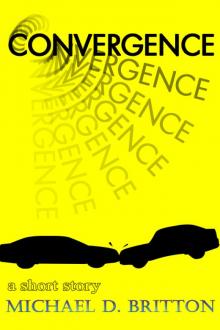 Convergence
Convergence Red Death
Red Death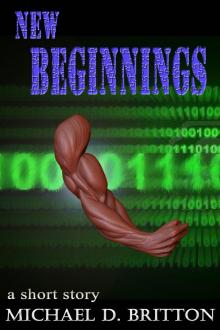 New Beginnings
New Beginnings Liberation
Liberation Old Wounds
Old Wounds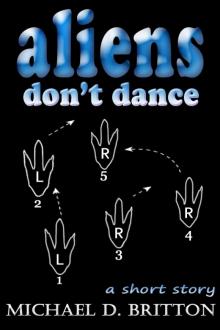 Aliens Don't Dance
Aliens Don't Dance Tag-Alongs
Tag-Alongs Broker
Broker Pause
Pause Predict THIS
Predict THIS AaBack's Grimm: Dark Fantasy Fairy Tale #2 Friends Reunited: The Janus Beast, The Rose Beauty, And The Cursed Duckling
AaBack's Grimm: Dark Fantasy Fairy Tale #2 Friends Reunited: The Janus Beast, The Rose Beauty, And The Cursed Duckling Unsettling Things & Other Stories
Unsettling Things & Other Stories Ask Grench
Ask Grench Strings
Strings Going to the Dogs
Going to the Dogs Switch
Switch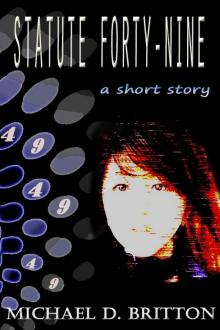 Statute Forty-Nine
Statute Forty-Nine Brain Storm
Brain Storm Royal Flush
Royal Flush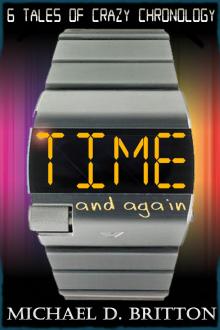 Time and Again: A Collection of Crazy Chronology
Time and Again: A Collection of Crazy Chronology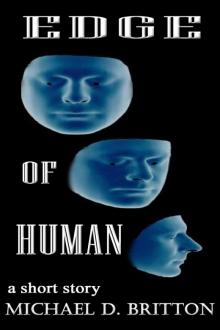 Edge of Human
Edge of Human A Sense of Souls
A Sense of Souls Decisions, Decisions
Decisions, Decisions Dream Soldiers
Dream Soldiers Spies: 7 Short Stories
Spies: 7 Short Stories Prowler: Three Haunting Tales
Prowler: Three Haunting Tales The Release
The Release Lunar Tales - an anthology
Lunar Tales - an anthology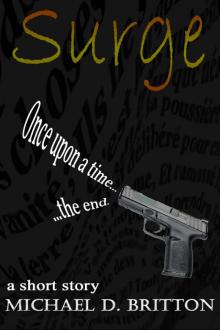 Surge
Surge Sole Survivarrrgh
Sole Survivarrrgh Remember
Remember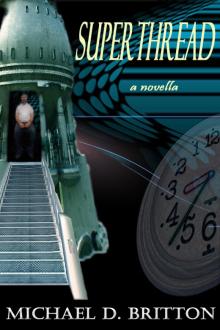 Superthread
Superthread Deceive the Paradox
Deceive the Paradox Project: Dreamer
Project: Dreamer No Man to Trifle With
No Man to Trifle With Diaspora
Diaspora Quartet for Three
Quartet for Three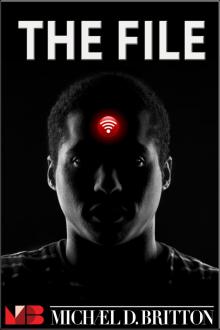 The File
The File These Dark Electrons
These Dark Electrons Honored: 7 Honorable Mention Stories from the Writers of the Future Contest
Honored: 7 Honorable Mention Stories from the Writers of the Future Contest Balls
Balls The Final Testament
The Final Testament The Exile
The Exile OtherPlace
OtherPlace